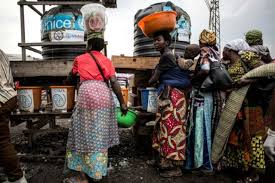

The World Health Organization (WHO) has pledged to investigate allegations that aid workers tackling the Ebola outbreak in the Democratic Republic of Congo sexually abused and exploited women.
The WHO and other aid agency staff were accused by 50 women in a joint investigation by two news agencies.
Local women were allegedly plied with drinks, ‘ambushed’ in hospitals, forced to have sex, and two became pregnant.
The allegations cover the period between 2018 and March this year.
The New Humanitarian news agency and the Thomson Reuters Foundation have carried out an almost year-long investigation.
The WHO said the allegations would be ‘robustly investigated’.
‘Anyone identified as being involved will be held to account and face serious consequences, including immediate dismissal,’ it said in a statement.
‘The betrayal of people in the communities we serve is reprehensible.’
More than 2,000 people died in the Ebola outbreak in DR Congo.
The WHO, which spearheaded global efforts to curb the spread of the outbreak, declared it over in June this year.
The UN and aid agencies have previously promised zero tolerance of sexual abuse following similar allegations against some of their staff in other countries.
A spokesperson for the UK’s Foreign, Commonwealth and Development Office said it would scrutinise the WHO findings closely, adding: ‘Sexual exploitation and abuse are completely abhorrent’.
Most of the allegations of sexual abuse and exploitation were against men, including doctors, said to be from the WHO. At least 30 women made allegations against them, the news agencies reported.
The next highest number of allegations – made by eight women – were against men said to be from DR Congo’s health ministry.
Two other UN agencies, and four international charities, were also named in the report.
Some of the accused men came from Belgium, Burkina Faso, Canada, France, Guinea-Conakry and Ivory Coast.
Many men refused to wear condoms, and at least two women said they became pregnant as a result of the abuse, the news agencies reported.
more recommended stories
 Somaliland Presidency Delivers 10 Vital Dialysis Machines to Hargeisa Group Hospital
Somaliland Presidency Delivers 10 Vital Dialysis Machines to Hargeisa Group HospitalHargeisa – Somaliland – The President.
 Electricity Without Accountability: Public Outrage Grows in Burao Electricity Debate
Electricity Without Accountability: Public Outrage Grows in Burao Electricity DebateHigh electricity costs in Burao have.
 Somaliland President Meets UK Diplomats to Discuss Future Cooperation and Investment Opportunities
Somaliland President Meets UK Diplomats to Discuss Future Cooperation and Investment OpportunitiesPresident Cirro Meets Outgoing and Incoming.
 President Cirro Reaffirms Somaliland’s Sovereignty in Meeting with Top UN Humanitarian Official
President Cirro Reaffirms Somaliland’s Sovereignty in Meeting with Top UN Humanitarian OfficialHargeisa, Somaliland – April 6, 2025:President.

